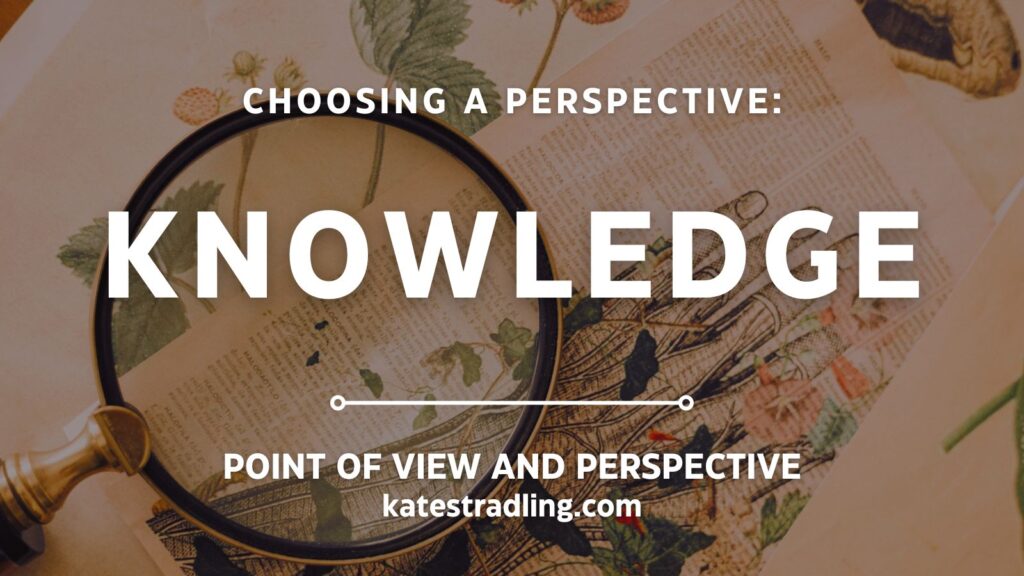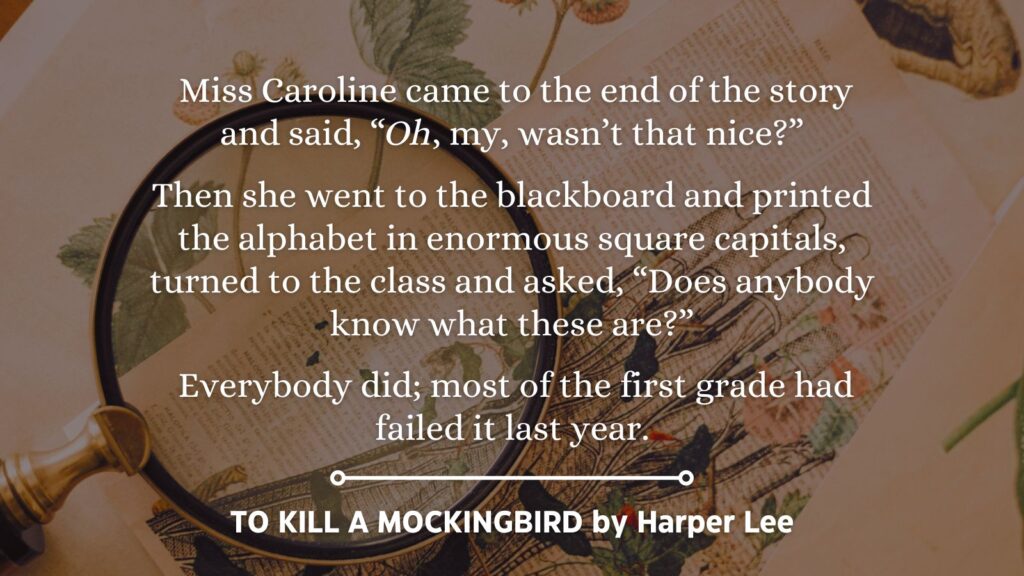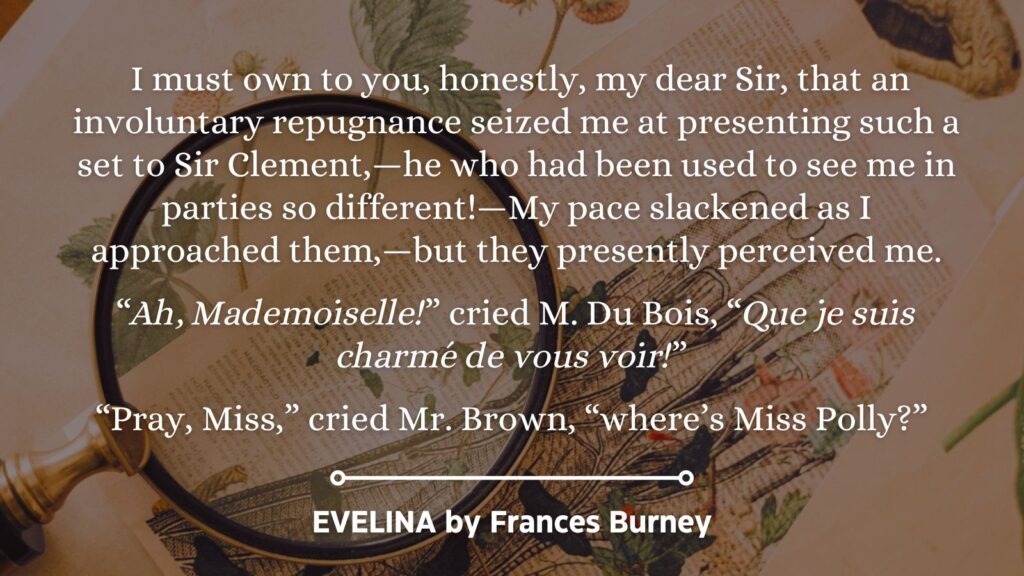Our final consideration in Choosing a Perspective is Knowledge, a trait that quizzically inspires both envy and disdain.

This consideration invites a series of questions:
- How much does the Viewpoint Character know about your main conflict? How much do they understand? Is it more or less than the Reader?
If your desired Viewpoint Character knows more than the Reader, this introduces opportunities for Narrative Ambiguity. They can twist their account to manipulate what details emerge, and when.
If they know less, this allows for Dramatic Irony, where the Reader understands nuances or foreshadowing that the Viewpoint Character does not.
If both the Reader and the Viewpoint Character know the same amount of information about the plot, this creates narrative tension and suspense as events unfold.
One Major Caveat
My only warning when considering the degree of Knowledge: Beware the Know-It-All.
If your Viewpoint Character has all the answers and always knows exactly what’s happening, they might be the least interesting person to tell the story. Too much Knowledge can affect their Likeability and thus presents the question of whether a different Viewpoint Character would better serve the story.
Renowned Know-It-All Sherlock Holmes has the less intuitive Dr. Watson to tell his tale. So too does Hercule Poirot have his more prosaic Captain Hastings. Both Holmes and Poirot incurred the deep contempt of their respective creators—Arthur Conan Doyle and Agatha Christie—but audiences, who did not have to be so close and personal thanks to the filters of Watson and Hastings, adored them.
In the worst case scenario, a Know-It-All Narrator comes across as smug or condescending, a Mary Sue flaunting insight and intelligence. No one wants a teacher’s pet in Narrator form. If you’re intent on using such a Viewpoint Character, be intentional about it, but be careful of your intended Readers’ sensibilities as well.
Also, consider giving your narrator a genuine reason to withhold their knowledge. Which nicely segues into our final tangent:
The Unreliable Narrator
An Unreliable Narrator is one whose delusion, deceitfulness, or naivety skews how they relate the events of the Story. They often—but not always—know more than they’re telling, couch their words in hedges and ambiguity, conveniently omit relevant details, and frame events to reflect favorably on themselves.
We see this in Edgar Allen Poe’s short story “The Tell-Tale Heart,” where the Viewpoint Character believes that his atrocious crime is fully justified and that he was so clever in its execution. But far from committing the perfect crime, he gets detected within hours and confesses under the weight of his own delusions.
In THE MURDER OF ROGER ACKROYD by Agatha Christie, Dr James Sheppard narrates with a pretense of clinical objectivity, but he conveniently omits details, including his own shady dealings in the village. It’s up to the Reader and Detective Hercule Poirot to notice those missing threads. (And note: Captain Hastings is not a character in this book, but Christie still doesn’t have Poirot narrate his own adventure. In fact, in the Poirot canon, he only ever narrates two short stories, which are framed as him telling Hastings the events.)
The Naive Narrator
The Naive Narrator is a sub-category of Unreliable Narrator. In this, a Narrator relates difficult situations without understanding their true meaning or importance. It’s usually reserved for child narrators like Scout Finch or Huckleberry Finn.
In Harper Lee’s TO KILL A MOCKINGBIRD, when Scout tells of Tom Robinson’s trial and its surrounding events, her lack of understanding encourages the Reader’s critical thinking. Because our general Knowledge exceeds hers, we naturally look beyond what she says to the painful truths she unwittingly conveys. She doesn’t know how poor and backward-thinking Maycomb is, because it’s normal to her. As she relates these “normalities,” though, the Reader receives a clear picture of the setting and circumstances that will breed the novel’s deep injustice.

Too Much Knowledge, and Not Enough
A Narrator can be both Naive and Unreliable. Frances Burney’s EVELINA tells of a country girl suddenly thrust into city fashions and society. However, Evelina, while naive, is aware of her naivety and sometimes leans into it for her own advantage.
For example, she refuses to speak French and allows others to believe that she does not understand it, all the while either translating or recording verbatim remarks made in this second language. And while her lack of social knowledge often gets her into trouble, she’s clever enough to use it as a means of getting out again, all while portraying herself as an innocent party.

The Unreliable Narrator is a delightful tool for manipulating how the Reader receives details and story events. This type of Viewpoint Character takes full advantage of their Audience’s Truth Bias, pointing them toward false conclusions and thereby enabling the Plot to twist as the Author pleases.
Conclusion
Thus ends my Point of View series. Although I’m sure there are gaps in my overviews, I hope I’ve sufficiently highlighted POV potential. This writing element plays a powerful part in story-craft, with a seemingly endless array of options.
But the one true guideline? Be deliberate.
After all, what is writing if not an invitation to see the world from a new perspective?
Previous: Likeability
Index Page: Point of View